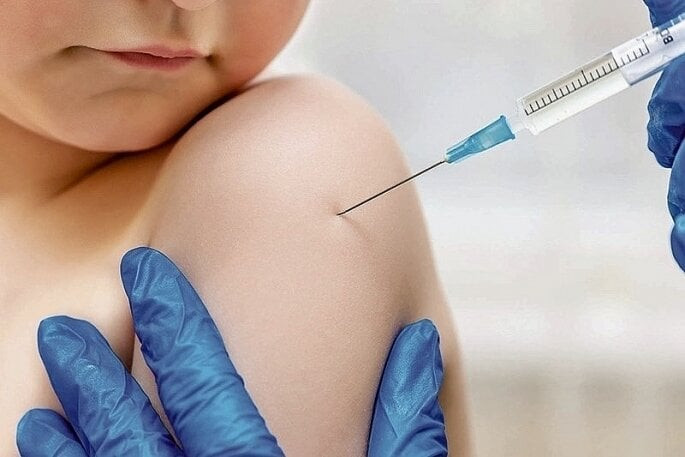According to the Ministry of Health, in the first 5 months of 2024, the vaccination rate of "5 in 1" vaccine containing diphtheria and whooping cough for children 2, 3 and 4 months old was only 36.8%.

According to the Expanded Immunization Plan for 2025 recently issued by the Ministry of Health, in the first 5 months of this year, the vaccination rate in the expanded immunization program has not met the schedule. Only the tuberculosis vaccine, measles vaccine and DPT vaccine with diphtheria component (injected for older children at 18-24 months of age) have met the schedule, with a rate of 40%.
Meanwhile, the vaccination rate for the "5 in 1" vaccine containing diphtheria and pertussis (DPT- DPT-VGB-Hib 3) for children aged 2, 3 and 4 months was only 36.8%. Similarly, the vaccination rate for the remaining vaccines such as hepatitis B vaccine in the first 24 hours of birth, encephalitis vaccine, and measles-rubella vaccine was only from 26% to 36%.
The Ministry of Health's 2025 expanded immunization plan includes tasks that need to be implemented such as purchasing vaccines for regular immunization, supplementary immunization, catch-up immunization, sweep vaccination, and deploying new vaccines in expanded immunization in 2025, including 11 types of vaccines: neonatal hepatitis B, tuberculosis, oral polio, measles, measles - rubella, Japanese encephalitis, diphtheria - pertussis - tetanus (DPT at 4 years old), tetanus - diphtheria (Td) reduced dose for children 7 years old, tetanus, rotavirus, and DPT-VGB-Hib.
Provinces and cities will organize hepatitis B vaccination for newborns at hospitals and health stations, organize vaccination for children with underlying diseases, and children who need to be screened at hospitals. Localities will organize regular vaccination at least twice a month, carry out catch-up vaccinations within the month; carry out catch-up vaccinations and catch-up vaccinations for expanded vaccination for those who have not been vaccinated or have not received enough doses.
According to the National Expanded Immunization Program, children under 1 year old are vaccinated with 3 doses of combined vaccine containing diphtheria at 2, 3, and 4 months of age. This is the basic dose to prevent diphtheria in children. However, the antibody concentration after the basic dose will gradually decrease over time, so booster shots are needed to strengthen long-term protective immunity against diphtheria.
Since 2011, the Expanded Immunization Program has implemented the fourth booster dose of diphtheria-pertussis-tetanus (DPT) vaccine for children aged 18-24 months. Thanks to the high vaccination rate of diphtheria vaccine over 90% over the past years, it has contributed to a significant reduction in the number of diphtheria cases.
During the years 2013 - 2020, a number of diphtheria outbreaks occurred sporadically in some localities. Patients were mainly found in older children and adults who had not been vaccinated, had not received enough doses of vaccine or had an unknown vaccination history. This shows the need to implement a booster dose of diphtheria vaccine for older children when they enter school age.
To proactively prevent and control diphtheria, since 2019, the Ministry of Health has annually deployed the reduced-dose tetanus-diphtheria vaccine (Td) for 7-year-old children in provinces and cities at high risk of epidemics, which are provinces with diphtheria cases and low vaccination rates. The scope of Td vaccination from 30 provinces and cities in 2019 has been expanded to 37 provinces and cities this year.
TH (according to VTC News)